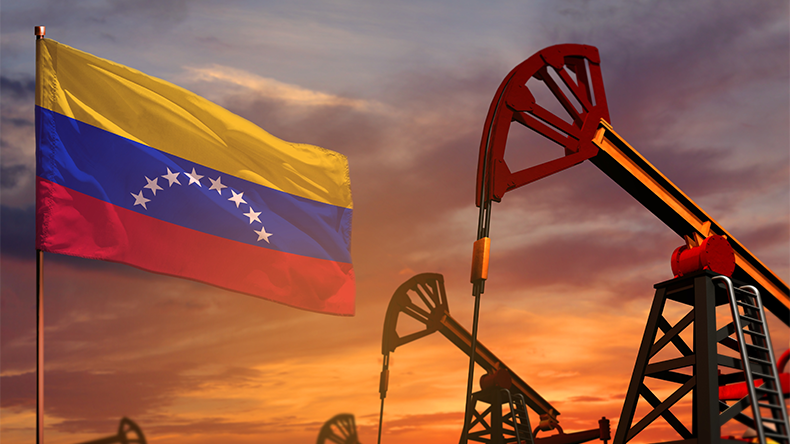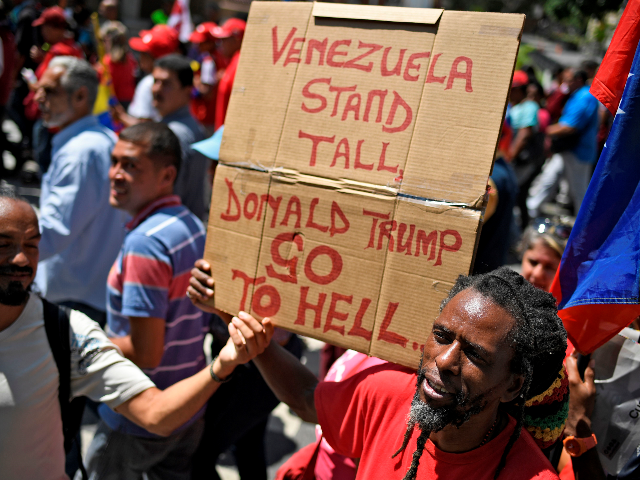
Economic Sanctions as Collective Punishment: The Case of Venezuela
Mark Weisbrot and Jeffrey Sachs / Center for Economic and Policy Research
Executive Summary
(April 2019) — This paper looks at some of the most important impacts of the economic sanctions imposed on Venezuela by the US government since August of 2017. It finds that most of the impact of these sanctions has not been on the government but on the civilian population.
The sanctions reduced the public’s caloric intake, increased disease and mortality (for both adults and infants), and displaced millions of Venezuelans who fled the country as a result of the worsening economic depression and hyperinflation. They exacerbated Venezuela’s economic crisis and made it nearly impossible to stabilize the economy, contributing further to excess deaths. All of these impacts disproportionately harmed the poorest and most vulnerable Venezuelans.
Even more severe and destructive than the broad economic sanctions of August 2017 were the sanctions imposed by executive order on January 28, 2019 and subsequent executive orders this year; and the recognition of a parallel government, which as shown below, created a whole new set of financial and trade sanctions that are even more constricting than the executive orders themselves.
We find that the sanctions have inflicted, and increasingly inflict, very serious harm to human life and health, including an estimated more than 40,000 deaths from 2017–2018; and that these sanctions would fit the definition of collective punishment of the civilian population as described in both the Geneva and Hague international conventions, to which the US is a signatory. They are also illegal under international law and treaties which the US has signed, and would appear to violate US law as well.
The August 2017 Sanctions
The August 2017 sanctions prohibited the Venezuelan government from borrowing in US financial markets. This prevented the government from restructuring its foreign debt, because any debt restructuring requires the issuance of new bonds in exchange for the existing debt. Thus, these sanctions prevented the economy from recovering from a deep recession which had already taken a large toll on the population, which along with the economy was more vulnerable to these sanctions and the ones that followed as a result of the economic crisis.
Real GDP had already declined by about 24.7 percent from 2013 through 2016, and consumer price inflation for January to August 2017 was probably somewhere between 758 percent and 1,350 percent at an annual rate.
It is important to emphasize that nearly all of the foreign exchange that is needed to import medicine, food, medical equipment, spare parts and equipment needed for electricity generation, water systems, or transportation, is received by the Venezuelan economy through the government’s revenue from the export of oil. Thus, any sanctions that reduce export earnings, and therefore government revenue, thereby reduce the imports of these essential and, in many cases, life-saving goods.
The August 2017 sanctions adversely impacted oil production in Venezuela. But following the August 2017 executive order, oil production crashed, falling at more than three times the rate of the previous twenty months. This would be expected from the loss of credit and therefore the ability to cover maintenance and operations and carry out new investments necessary to maintain production levels. This acceleration in the rate of decline of oil production would imply a loss of $6 billion in oil revenue over the ensuing year.
This by itself is an enormous loss of foreign exchange, relative to the country’s need for essential imports. Imports of food and medicine for 2018 were just $2.6 billion. Total imports of goods for 2018 were about $10 billion.
The loss of so many billions of dollars of foreign exchange and government revenues was very likely the main shock that pushed the economy from its high inflation, when the August 2017 sanctions were implemented, into the hyperinflation that followed.
Other executive decisions made by the Trump administration resulted in the closure of Venezuelan accounts in financial institutions, loss of access to credit, and other financial restrictions that have had severe negative impacts on oil production as well as the economy, as detailed in this paper.

Sanctions in 2019
The most immediate impact of the January sanctions was to cut off Venezuela from its largest oil market, the United States, which had bought 35.6 percent of Venezuela’s oil exports in 2018, or about 586,000 barrels per day on average. In the week of March 15, US imports of Venezuelan oil fell to zero for the first time, and they remained at zero for another two weeks before rebounding to a fraction of their 2018 average.
The Trump administration also intervened to pressure other countries, including India, not to buy the oil that had been previously imported by the US. For example, on March 28, Reuters reported that “[t]he United States has instructed oil trading houses and refiners around the world to further cut
dealings with Venezuela or face sanctions themselves, even if the trades are not prohibited by published US sanctions…”
These threats are effective because the US government can sanction foreign financial institutions who do not comply with its demands.
As a result of these and other efforts Venezuela’s oil production declined by 130,000 barrels per day from January to February. In the six months prior, it was declining by an average of 20,500 barrels per day. Then in March it fell another 289,000 barrels per day, for a total of 431,000 barrels per day. This is an economically devastating 36.4 percent plunge in oil production just since the January sanctions.
This drop, if maintained over the next year, would cut another $6.8 billion from Venezuela’s available foreign exchange earnings. This is about 21 percent of export earnings from 2018. However, oil export revenues in 2019 are projected to fall by a cataclysmic and unprecedented 67.2 percent from 2018, as a result of the impact of tightening sanctions.
The January sanctions also froze many billions of dollars of Venezuelan assets that could have been sold in order to maintain essential and life-saving imports, or to stabilize the economy. These included most of the government’s $9 billion in reserves that are in gold; trade credits worth an estimated $3.4 billion; and CITGO, with estimated net assets of $5.2 billion.
After the January sanctions and the recognition of Guaidó as “interim president” — which made him, according to the Trump administration and other governments recognizing the parallel government — the legal owner of any funds transferred or goods bought by the Venezuelan government, Venezuela’s access to correspondent banks for international transactions was mostly wiped out. This included access to necessary credits for imports of medicine, food, and other essential goods.
The sanctions have also contributed substantially to the length and economic damage of power outages, including the severe electricity crises in March.
For example, the sanctions have limited Venezuela’s access to diesel fuel, which is needed for its backup thermal generators. Further, Venezuela’s electrical sector relies upon equipment provided by international suppliers such as General Electric. The sanctions prevented the Venezuelan government from paying these companies, thereby increasing reliance on hydroelectric power generation.

The Impact of Sanctions on Human Life and Health
One result of the sanctions, as described above, is to deprive the Venezuelan economy of many billions of dollars of foreign exchange needed to pay for essential and life-saving imports. The sanctions implemented in 2019, including the recognition of a parallel government, accelerated this deprivation and also cut off Venezuela from most of the international payments system, thus ending much of the country’s access to these essential imports including medicine and food — even those that could normally be bought with available dollars. There is no doubt that all of these sanctions since August 2017 have had severe impacts on human life and health.
According to the National Survey on Living Conditions (ENCOVI by its acronym in Spanish), an annual survey of living conditions administered by three Venezuelan universities, there was a 31 percent increase in general mortality from 2017 to 2018. This would imply an increase of more than 40,000 deaths.
More than 300,000 people were estimated to be at risk because of lack of access to medicines or treatment. This includes an estimated 80,000 people with HIV who have not had antiretroviral treatment since 2017, 16,000 people who need dialysis, 16,000 people with cancer, and 4 million with diabetes and hypertension (many of whom cannot obtain insulin or cardiovascular medicine).
These numbers by themselves virtually guarantee that the current sanctions, which are much more severe than those implemented before this year, are a death sentence for tens of thousands of Venezuelans. This is especially true if the projected 67 percent drop in oil revenue materializes in 2019.
The accelerating economic collapse that current sanctions have locked in assure further impacts on health, and premature deaths. For example, the increasing collapse of export revenue — and therefore imports — has also created massive public health problems in the areas of water and sanitation. The electricity crisis has also impacted hospitals and health care.
Food imports have dropped sharply along with overall imports; in 2018 they were estimated at just $2.46 billion, as compared with $11.2 billion in 2013. They can be expected to plummet further in 2019, along with imports generally, contributing to malnutrition and stunting in children.
The United Nations finds that the groups most vulnerable to the accelerating crisis include children and adolescents (including many who can no longer attend school); people who are in poverty or extreme poverty; pregnant and nursing women; older persons; indigenous people; people in need of protection; women and adolescent girls at risk; people with disabilities; and people who identify as lesbian, gay, bisexual, transgender, or intersex.
Illegality of the Sanctions
The unilateral sanctions imposed by the Trump administration are illegal under the Charter of the Organization of American States (OAS), especially articles 19 and 20 of Chapter IV. They are also illegal under international human rights law, as well as treaties signed by the United States.
The sanctions also violate US law. Each executive order since March 2015 declares that the United States is suffering from a “national emergency” because of the situation in Venezuela. This is required by US law in order to impose such sanctions, and the national emergency is invoked under the 1976 National Emergencies Act. This is the same law that President Trump invoked in February 2019 when declaring a national emergency to circumvent Congressional appropriation for funds to build a wall along the border with Mexico.
The executive order also states, as required by law, that Venezuela presents “an unusual and extraordinary threat to the national security” of the United States. There is no foundation in fact for either of these declarations.
Posted in accordance with Title 17, Section 107, US Code, for noncommercial, educational purposes.